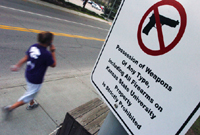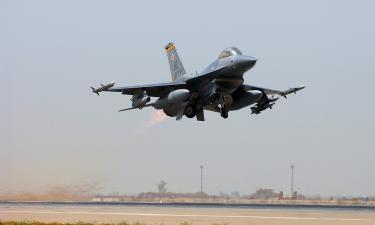US students demand guns

Self-defense and bloodshed prevention mean that students must have more guns, Mike Guzman and thousands of other students say.
Guzman, an economics major at Texas State University-San Marcos, is among 8,000 students nationwide who have joined the nonpartisan Students for Concealed Carry on Campus, arguing that students and faculty already licensed to carry concealed weapons should be allowed to pack heat along with their textbooks.
"It's the basic right of self-defense," said Guzman, a 23-year-old former Marine. "Here on campus, we don't have that right, that right of self-defense."
Every state but Illinois and Wisconsin allows residents some form of concealed handgun carrying rights, with 36 states issuing permits to most everyone who meets licensing criteria. The precise standards vary from state to state, but most require an applicant to be at least 21 and to complete formal instruction on use of force.
Many states forbid license-holders from carrying weapons on school campuses, while in states where the decision is left to the universities, schools almost always prohibit it. Utah is the only state that expressly allows students to carry concealed weapons on campus.
College campuses are different from other public places where concealed weapons are allowed. Thousands of young adults are living in close quarters, facing heavy academic and social pressure - including experimenting with drugs and alcohol - in their first years away from home.
W. Gerald Massengill, the chairman of the independent panel that investigated the Virginia Tech shootings, said those concerns outweigh the argument that gun-carrying students could have reduced the number of fatalities inflicted by someone like Tech gunman Seung-Hui Cho.
"I'm a strong supporter of the Second Amendment," Massengill, a former head of the Virginia state police, said referring to the part of the U.S. Constitution that prohibits infringement on Americans' right to bear arms. "But our society has changed, and there are some environments where common sense tells us that it's just not a good idea to have guns available."
His view is echoed by Peter Hamm, a spokesman for the Brady Campaign to Prevent Gun Violence, who says campus safety concerns cannot be addressed by adding more guns to campuses.
"If there's more we need to do, we certainly need to do that, but introducing random access to firearms is not the solution," said Hamm. "You have more victims, not fewer victims."
Students for Concealed Carry on Campus gathered momentum after the April killings at Virginia Tech, where the gunman shot 32 people dead before killing himself.
With the help of the social networking Web site Facebook, the group mushroomed and organized its first nationwide protest in October. The group says it is not affiliated with the National Rifle Association, a political party or any other organization.
Like the students at TSU-San Marcos who were pushing Monday for a student government resolution on the issue, students at more than 110 colleges and universities went to class wearing empty holsters, said Scott Lewis, the national group's spokesman.
"We're not proposing to arm every student. We're not proposing that every freshmen get a handbook and a Glock," he said.
But he said students who are licensed to carry concealed firearms to movie theaters, public parks and other places should be allowed to take them on campus as well.
Candace Soya, a 20-year-old student at TSU-San Marcos, said she fears chaotic shootouts. If someone decided to open fire on the tree-lined quad in the middle of her campus, armed students would likely make matters worse, she said.
"It's not a situation where you can fight fire with fire," Soya said.
But advocates pushing for the campus concealed carry right say it's not just incidents like the one at Virginia Tech that create concern.
Campuses in higher-crime urban neighborhoods also pose risks for students, said Michael Flitcraft, a 23-year-old mechanical engineering student at the University of Cincinnati.
He argues, like most gun rights advocates, that weapons-free regulations only deter law-abiding students, not thugs or mentally ill shooters.
"Laws only affect the people who voluntarily abide by them," Flitcraft said.
Subscribe to Pravda.Ru Telegram channel, Facebook, RSS!





